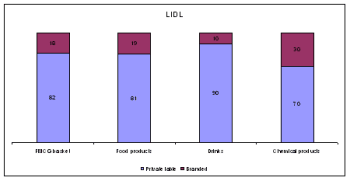
Sie sind hier: Pet-Business International Ungarn Unternehmen Companies Retail
Success Is Mostly Due to Private Label ProductsLidl opened its first shop in Hungary in November 2004, and in that very month it reached 8.2% of Hungarian households, and 29% of the households in the first half. This means that nearly one in three households has already bought something in a Lidl shop – GfK Hungárias research called TargetOn: Lidl 2006 has found. As regards the market share of the different shop types, it is still hypermarkets that realise a quarter of the total FMCG turnover. At the same time, Lidls entry into the market has increased the steady 15% market share discount stores had since 2001 by 1.5-2 percentage points. During the first month following Lidls entry into the market, Lidl obtained a bigger market share than some of its competitors, and has maintained that level since then. The customers who did their shopping at Lidl during the first six months of the operations of the newest discount chain, spent less in the shops of other discount chains or in independent or small shops. At the same time, the loyalty of Lidl customers is low, since the customers of the chain do 92% of their shopping in other shops. However, this is typical of other discount stores and the whole country as well: customers are not loyal to a shop or chain of shops, they use almost all shop types and opportunities for their shopping. The proportion of Budapest residents among those who have tried the chain is above the average, but few of them do their shopping at Lidl for the second time as well. The residents of small towns and big towns are overrepresented among those who return, since it is these types of settlements where Lidl shops can be found. The average amount spent annually at Lidl by a household was HUF25,000 (appr. EUR 100) during the first six months of its operations. People from Southern Hungary, those living in small and big towns, 3-4 person households with children and housewives under 40 and people with medium or relatively high income are overrepresented among returning customers. The study has found that households spent HUF2,600 (appr. EUR 10,4) per visit on FMCG products at Lidl on average last year. Discount chains in general have achieved the highest market share in the sales of food products and drinks – so has Lidl. The reason for it is that the average price of these categories is 20-40% lower at Lidl than the average price on the whole market. It has the biggest market share in the markets of deep-frozen pizzas, roast coffee blends, ice tea, cream cheese, salad dressings and breakfast cereals. An overwhelming majority of products sold by the discount chain (82%) are private label products. The market share of Lidls private label products on the whole market of private label products is 11.5%, which secures one of the strongest positions for it on the market. The share of private label brands within the shop was especially high, 90%, in the case of drinks. The study also reveals how successful Lidl is compared to its competitors.  Share of private label products at Lidl by product category, and as a proportion of the total market turnover value, November 2004 – April 2005 (percentage) Lidl is planning to open about 100 shops in Hungary on the long run. It wishes to increase its penetration quickly through opening new shops; however, getting the highest possible proportion of customers to return as frequently as possible can be a key factor in increasing the turnover. Lidls success in Hungary lies in the fact that it can offer products at low prices, which it ensures through keeping the costs of logistics, communication, equipment and staff low. Since further discount chains are expected to enter the Hungarian market in the near future, it will restructure the Hungarian retail trade even more. |
|
|||||||||||||||||||||||||||||||||||||||||||||||||
| © 2024 PETCOM | Nutzungsbedingungen | Datenschutzerklärung | Kontakt/Impressum | Partner |
| Content Management System by SiteWare CMS | Design & Technology by jimpanse.biz & COMMUNITOR WebProduction |
